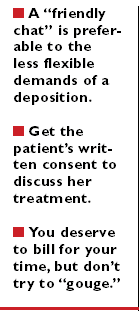Article
If an attorney wants a "friendly chat"
A "friendly chat" is certainly preferable to the unwelcome and less flexible demands of a deposition.

A Legally you don't have to talk to a plaintiff's attorney unless you're subpoenaed. But if you refuse, you just might be served with a subpoena, forcing you to testify at a deposition. A "friendly chat," arranged at a mutually convenient time, is certainly preferable to-and may obviate the need for-the unwelcome and less flexible demands of a deposition.
However, before you agree to the interview, there are several steps you should take for your protection. First, ask the plaintiff's attorney if he intends to name you as a co-defendant. If he does, refuse the interview. If he assures you he won't, get it in writing. That way, if he later names you in the suit, the letter would become a valuable weapon in your defense, and an embarrassment to the attorney.
If during the interview the plaintiff's lawyer asks for your "expert opinion" about whether the defendant met the standard of care, the proper response is that, since you haven't been retained as an expert, you haven't examined the records in enough detail to form such an opinion.
If your role in the case is vital, you should be able to negotiate a fair payment for your time. But while you're entitled to charge for your time away from your office, be reasonable: say $200 to $300 an hour. If you try to "gouge" the lawyer with an unreasonable fee, he could subpoena you to appear in court to justify your demand.
Be sure to discuss your fee up front, however, and get a written agreement from the attorney that he'll reimburse you at that rate. That's particularly important in cases when your opinion may not support the plaintiff's claim for damages. If the attorney reneges on his promise to pay your fee, notify the state bar association, including a copy of his agreement to pay it.





